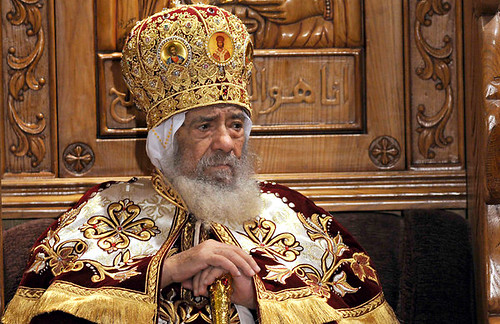
Orthodox Christian Pope Shenouda III of Egypt has died. The Coptics are the oldest organized Christian church in the world., a photo by Pan-African News Wire File Photos on Flickr.
3 November 2012
Last updated at 21:05 ET
Egyptian Copts await new pope to succeed Shenouda III
A council of Egypt's Coptic Christians voted for a shortlist of candidates last week
Egypt's Coptic Christians will learn the name of their new pope on Sunday, when a blindfolded child selects the name of one of three candidates.
Two bishops and a monk are on the shortlist to become the 118th leader of the largest Christian minority in the Middle East, about 8 million strong.
The individual chosen will succeed Pope Shenouda III, who died in March.
Attacks on Copts are on the increase, and many Copts say they are afraid of the governing Muslim Brotherhood party.
Pope Shenouda, who led the church for four decades, had urged officials to do more to address Copts' concerns.
The shortlisted candidates are Bishop Raphael, Bishop Tawadros and Father Raphael Ava Mina. They were chosen in a ballot by a council of some 2,400 Church and community officials in October.
Their names will be written on pieces of paper and placed in a box on the altar of St Mark's Cathedral in Cairo.
A blindfolded boy will then be asked to draw out one of the names. Copts say this process ensures the selection is in God's hands.
Many leading Copts believe the new pope should play a less overtly political role. Activists hope that ordinary Copts can make their voices heard by winning more seats in the now democratically elected parliament.
Yet the new pope may want to make his views known quickly on how prominent a role Islamic, or Sharia, law should play in the new constitution currently under negotiation.
He will also need to calm fears that Copts could be squeezed out of government jobs, and even that new sectarian strife could erupt.
Conservative church in changing times
The chosen man will be enthroned in a ceremony on 18 November.
But the BBC's Jon Leyne in Cairo says no-one in Egypt expects the new pope to introduce any radical changes to the deeply conservative church.
Under Pope Shenouda, the Coptic Church expanded significantly, including outside its traditional Egyptian base.
He was a passionate advocate of unity among the Christian churches, and also clashed with then President Anwar Sadat, particularly over their conflicting views on the future of Egypt's relationship with Israel.
Coptic Christians have long complained of discrimination by the Egyptian state and the country's Muslim majority.
But when President Hosni Mubarak was ousted last year and succeeded by the Muslim Brotherhood, their fears grew.
In October 2011, 25 people died in clashes with the security forces after a protest march in Cairo over the burning of a church.
No comments:
Post a Comment